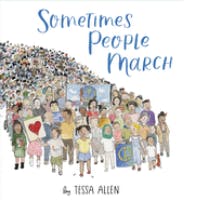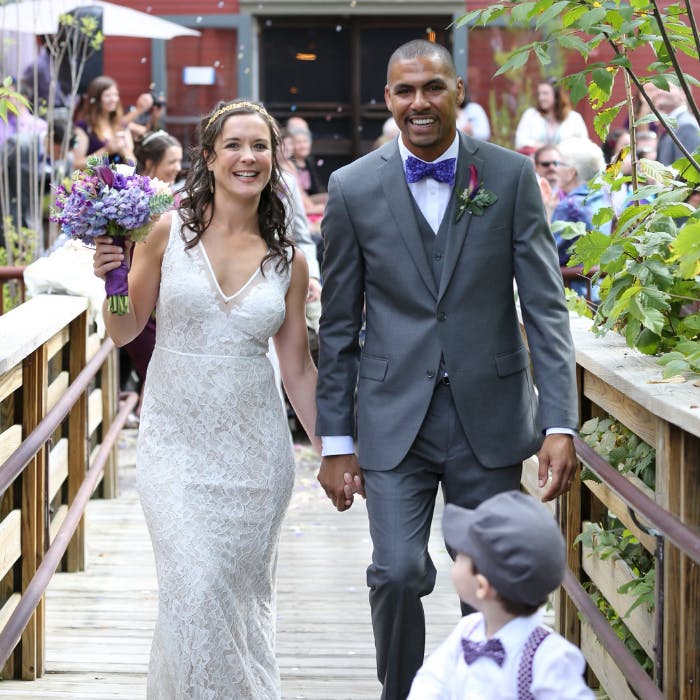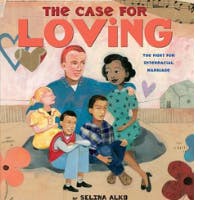Loving Book Conversations
by Megan Dowd Lambert

The author’s four sons in May 2021: (l–r) Stevie (16), Jesse (6), Zachary (3), and Rory (24).
I’ve
become increasingly appreciative of children’s books I once might’ve
dismissively called “didactic.” Yes, there’s a tremendous need for what some
call “everyday diversity” or “casual diversity” in children’s books, and I also
think we need books for young readers that overtly grapple with racism and
other oppressions in historical and contemporary contexts. Such books can
bolster confidence, resilience, and empathy in readers; but oftentimes in order
for those positive outcomes to be realized, we adults must recognize books as
conversation starters, not an end unto themselves.
I confronted this reality in the fall of 2020 when I read Sometimes People March by Tessa Allen with my then-five-year-old son Jesse, who, like his little brother, Zachary, my husband, Sean, and I, is White, while the other five children in our family are Black or Puerto Rican. Zachary, then almost three, was playing nearby as Jesse and I snuggled up and read this picture book’s sweeping overview of social justice movements, protests, and the oppressive forces they resisted in the past and currently.

One thing I appreciate about this book is how it visually connects historical and contemporary events with illustrations of protesters across generations. As we read, I found myself pointing to pictures to explain the contexts to Jesse, saying, for example,
“On this page there are people protesting at the Standing Rock Indian Reservation to resist the Dakota Access Pipeline because building it to bring oil throughout the US would poison the water on the land of Indigenous people. That protest happened when you were about one year old.” Then we looked on the facing page. “And over here, there’s a picture of Mildred Jeter and Richard Loving. They lived when it was illegal for a White person and a Black person to get married in their state, and that was a really unfair, racist law or rule. They went to court to change the law, and they won. That happened when your grandmother was still growing up.”
Jesse earnestly soaked up what I was sharing with him, and I was grateful for the book’s back matter, which helped me answer his questions with specific dates and details. “We march sometimes, too,” he said as we closed the book.
“Yes,” I said. “When do you remember marching?”
“We went two times to say that families should be together,” he said, recalling when our family participated in protests against the Trump administration’s policy of family separation at the border. “And we went to Black Lives Matter marches, too,” he said.
“Yes, we did. Why do you think we went to those protests and marches?” I asked.
“It’s obvious,” he said. “Black lives do matter. And families should be together.”
“Right. So we can’t just sit around and do nothing if those things aren’t obvious to everyone,” I said. “And like the book says, ‘People are more powerful together.’ And ‘Sometimes from feelings of fear or anger or injustice comes hope for change.’”
We ended that conversation feeling affirmed and bonded in our shared values and enlightened by Allen’s elegantly simple introduction to the need for collective action to effect positive social change.
The next day, Zachary went to my sister’s house for the day while Jesse came to my office with me to attend his remote kindergarten class, then in session because of the Covid-19 pandemic. We drove to pick up Zachary after school, and when I got there, my sister pulled me aside.
“What’s up?” I asked, noting concern on her face.
“Well, Zachary and I had quite a conversation today,” she began.
“About what?” I asked.
“Just out of the blue he said, ‘You and Uncle Lee can’t be married, Auntie Keita.’ I asked him why he would say that, and he said, ‘Because you’re White and Uncle Lee is Black.’”
“Oh my god,” I said, immediately connecting the dots to the conversation Zachary overheard me and Jesse having about the Lovings’ depiction in Sometimes People March. “I’m so sorry.”
“I was just really shocked. I mean I know you obviously aren’t teaching him that. I told him that we definitely can be married, and he said you read a book that said we couldn’t, so I told him that was how it was a long time ago, but that we can be married now because love is love.”
“Yes,” I said. “Jesse and I were reading a book about protests, and it includes a part about the Loving case and about equal marriage rights for same-sex couples, too” I explained. “He must’ve been listening more than I thought he was, but clearly he missed the part about laws changing and historical context.”
“Clearly!” said my sister.

The author’s sister, Keita, and brother-in-law, Lee, on their wedding day in 2017, as the author’s son, Jesse the ring bearer (2), looks back over his shoulder.
After apologizing again, we drove home and I thought about how to address the matter with Zachary later that evening. At the very least, I could pull out our photo album with Keita and Lee’s wedding photos, and maybe I’d pull out another picture book, too. I knew we had Selina Alko and Sean Qualls’s The Case for Loving on our shelves…but would that go right over Zachary’s not-yet-three-year-old head, too? Maybe what he really needed was a better grasp of the concept of time. “A long time ago” could mean anything to him, I thought, recalling how when his older brother Rory was Zachary’s age he used the phrase “two-and-a-half weeks ago” as shorthand for anything that happened in the past.
In the end, Zachary beat me to the punch at dinnertime. That evening just he, Jesse, Sean, our then-fifteen-year-old, Stevie, and I were at the table. Soon after we’d tucked into our meal, Zachary said, “Stevie can’t be with us in our family because he is Black, and we are White.”
“What?” said Sean.
“I wonder where he got that from,” said Stevie.

I jumped in, “No. You’re wrong about that, Zachary,” I said, and then I turned to Stevie. “I’m really sorry you heard Zachary say that,” I told him. “Zachary overheard Jesse and me talking about a book that said that Black and White people couldn’t get married a long time ago because of unfair, racist laws, and he’s having a hard time understanding what that means for our family now.”
I then shared what my sister had told me about her conversation with Zachary earlier that day.
“Wait, he actually said that to her?” asked Stevie incredulously.
“Yes, and she told him that the unfair law changed a long time ago, so now she and Uncle Lee can be married.”
“Yeah, and Stevie is our brother, and Rory, Natayja, and Caroline are our siblings, too,” said Jesse referring to their other Black brother and sisters.
“Right,” said Sean. “We can all be a family because those laws changed, but there’s still a lot that’s unfair in our world, so we have to do what we can to help.”
“Like march!” said Jesse.
Zachary was quiet for most of this conversation. He didn’t seem defensive, or sad, or upset, and there’d been no malice in his statement. He was clearly a confused, very little boy trying to make sense of his world. As much as his pre-school-aged mind was grappling with race, he was thankfully too young to have reached a point of white fragility that would close him off to hearing us out.
“So do you understand that now Zachary?” I asked. “Like Auntie Keita told you, love is love. And so Stevie and all the kids are just as much a part of this family as you are, and Auntie Keita and Uncle Lee are married, right?”
“Right,” said Zachary.
“And I think you should apologize to Stevie in case what you said hurt his feelings,” I said.
“I’m sorry, Stevie,” said Zachary.
“It’s OK,” said Stevie.
I knew that this would be just one of many conversations Zachary and I would have about race and racism, working for change, and grappling with history. But honestly? I was more concerned about Stevie in this interaction. As we cleaned up after dinner I stopped and hugged him and said, “Are you OK? Even if you understand that Zachary didn’t mean to hurt you by saying what he did, I am sorry you had to hear it.”
“Yeah, yeah, I’m fine,” said Stevie.
I decided to take Stevie at his word and give him space. A few days later, I went up to his room to show him Allen’s book. “I’ve been thinking about our conversation at dinner the other day, and I wanted to know if you have been too,” I began.
“Not really,” he said. “But it was really messed up that he said that to Auntie Keita. And it was really messed up he said I couldn’t be in this family. I mean, what kind of book were you reading to them?”
“You’re right, it is messed up,” I said, wanting to validate his feelings since clearly he had been thinking about the conversation. Now was not the time to defend Zachary or brush aside his remarks as those of a confused two-year-old who meant no harm. “It wasn’t a book that was advocating against interracial families,” I explained. “It was this book that shows people protesting against all kinds of unjust laws and oppression.”
I flipped to the page with the depiction of the Lovings and showed it to Stevie. “That’s the couple whose case challenging the laws against interracial marriage went to the Supreme Court in the 1960s,” I told him.
“So why did he think it’s still like that?” asked Stevie.
I decided to give him my perspective since he’d asked, taking care not to minimize or invalidate his feelings. “I think because he’s still two, so he doesn’t really understand how time works and what it means that a law was in force ‘a long time ago.’ Also, I think he got stuck on the shock of a rule that could go against our family in so many ways.”
We talked for a while longer, and I asked if there was anything he wished I’d done differently to handle our dinnertime conversation, or to follow up with him, or with Zachary.
“I guess the only thing I wish you did differently was maybe not to read that book to Zachary in the first place. He obviously didn’t get it.”
“Fair,” I said. “Or, maybe what I should’ve done was involve him more in the reading and conversation. Part of the reason he didn’t get it was because he didn’t talk with Jesse and me about the book. He just heard parts and misinterpreted it.”
“Yeah, like the total opposite of what the book was trying to say,” said Stevie.
He had a point!
This conversation with Stevie left me feeling grateful to him for trusting me enough to share his thoughts and feelings. It also reinforced my awareness of the importance of discussing books I read with my kids, perhaps particularly those that are overtly didactic, instead of just reading them and leaving it at that.
On the 54th anniversary of the Loving case, I reread Sometimes People March with Zachary, who was three-and-a-half by then. We stopped at the page with the illustration of the Lovings, and I told him, “A long time ago, before Mommy was born, it was against the law for a Black person and a White person to be married in the state where these people named Mildred Jeter and Richard Loving lived. That was not fair, and so they helped change that law so now couples like Auntie Keita and Uncle Lee can be married anywhere in our country. Isn’t that good?”
“Yes!” said Zachary.
“So can Black people and White people marry each other if they want to now, right?” I asked to make absolutely certain he got it this time.
“Yes!”
“And that is good because love is…”
I paused to let him fill in the blank, wondering if he’d remember the line “love is love” that his auntie used, or if he’d fill in another positive word. Instead he said,
“…gross!”
I laughed out loud. “No, Zachary,” I said. “Love is the best thing in the world.”
“Well, Jesse and I think love is gross,” he said.
“No way,” I said. “Love is love! And that’s why it’s so good that we don’t have those unfair laws anymore.”
“Unfair is not loving,” said Zachary.
“Right. So what if you notice something unfair? What can you say or do about it?”
“Stop it!” said Zachary.
“And what if you do something unfair and someone tells you to stop it?”
“I can say sorry,” said Zachary.
“Is it gross for me to say I love you?” I asked.
“No,” said Zachary. “Love is love.”
Marching isn’t the only way to create change, of course. Sometimes people offer trust. Sometimes people apologize. Sometimes people forgive. Sometimes people have hard conversations. Sometimes people speak. Sometimes people listen. Sometimes people grow. Sometimes people read and discuss books. I’m grateful for books like Allen’s that can foster conversations to support all of these means toward change on personal and broader levels, if only we stop to have them.

Megan Dowd Lambert
Get Insights In your Inbox
Join the EmbraceRace community! You will receive the newsletter with our latest on race & kids, including upcoming events and opportunities, resources, community news and curated links.
Subscribe


